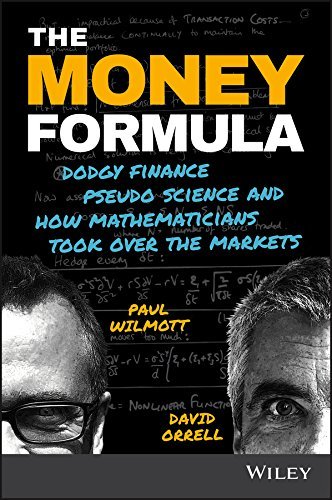
Explore the deadly elegance of finance's hidden powerhouse The Money Formula takes you inside the engine room of the global economy to explore the little-understood world of quantitative finance, and show how the future of our economy rests on the backs of this all-but-impenetrable industry. Written not from a post-crisis perspective – but from a preventative point of view – this book traces the development of financial derivatives from bonds to credit default swaps, and shows how mathematical formulas went beyond pricing to expand their use to the point where they dwarfed the real economy. You'll learn how the deadly allure of their ice-cold beauty has misled generations of economists and investors, and how continued reliance on these formulas can either assist future economic development, or send the global economy into the financial equivalent of a cardiac arrest. Rather than rehash tales of post-crisis fallout, this book focuses on preventing the next one. By exploring the heart of the shadow economy, you'll be better prepared to ride the rough waves of finance into the turbulent future. Delve into one of the world's least-understood but highest-impact industries Understand the key principles of quantitative finance and the evolution of the field Learn what quantitative finance has become, and how it affects us all Discover how the industry's next steps dictate the economy's future How do you create a quadrillion dollars out of nothing, blow it away and leave a hole so large that even years of "quantitative easing" can't fill it – and then go back to doing the same thing? Even amidst global recovery, the financial system still has the potential to seize up at any moment. The Money Formula explores the how and why of financial disaster, what must happen to prevent the next one.
Authors

David Orrell, Ph.D. is a scientist and author of popular science books. He studied mathematics at the University of Alberta, and obtained his Ph.D. from Oxford University on the prediction of nonlinear systems. His work in mathematical modeling and complex systems research has led him to diverse areas such as weather forecasting, particle accelerator design, economics, and cancer biology. He has authored or coauthored research papers for journals including Journal of the Atmospheric Sciences, Nature Genetics, the International Journal of Bifurcations and Chaos, and Physica D. He is the author of Economyths and The Other Side of the Coin: The Emerging Vision of Economics and Our Place in The World about new economic theories; and The Future of Everything: The Science of Prediction about prediction in weather, genetics, and economics, which was a national bestseller and finalist for the 2007 Canadian Science Writers' Association book award. Foresight called it "An engaging, as well as deeply insightful, discussion on the difficult task of prediction ... it can change the way you view forecasting." David has been a guest on radio shows including Coast to Coast AM, NPR, and BBC, and his work has been featured in print media such as New Scientist and the Financial Times. He has spoken at many conferences and events including the Art Center Global Dialogues on Disruptive Thinking. He currently lives in Oxford, UK, where he runs a mathematical consultancy Systems Forecasting. Awards Finalist: Canadian Science Writers' Association book award (2007) Finalist: National Business Book Award (2011)

Paul Wilmott is a researcher, consultant and lecturer in quantitative finance. He is best known as the author of various academic and practitioner texts on risk and derivatives, and for Wilmott magazine and Wilmott.com, a quantitative finance portal. He is the co-owner and Course Director for the Certificate in Quantitative Finance (CQF), a half year distance learning course on mathematical finance at 7City Learning, a London-based company providing training for the financial services industry. He is a founding partner of Caissa Capital, a volatility arbitrage hedge fund. He is on the editorial board of the academic journal International Journal of Theoretical and Applied Finance. He founded the Diploma in Mathematical Finance at Oxford University and the journal Applied Mathematical Finance. He is a director of Wilmott Electronic Media, which manages Wilmott.com, a website for the quantitative analyst community, and is a director of Paul & Dominic Quant Recruitment. He studied mathematics at St Catherine’s College, Oxford University, where he received his D.Phil in Applied mathematics in 1985.